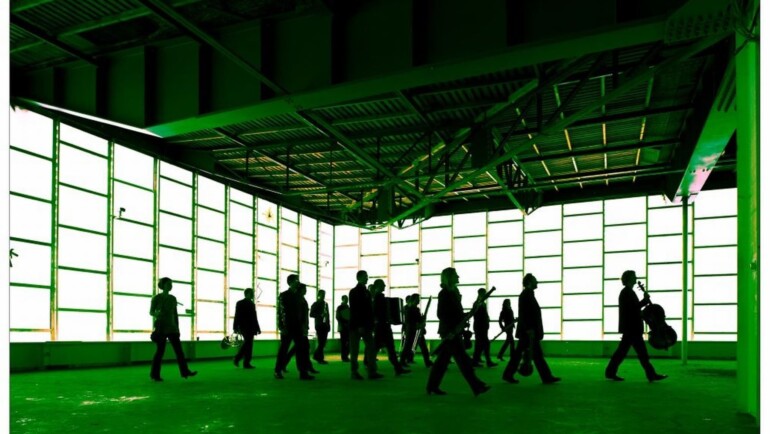
“Schluss mit traurig” – is the title of the current cycle of the ensemble Klangforum Wien in the Vienna Konzerthaus. The suggestive title “Schluss mit traurig” can be loosely translated in English with “enough with the sadness” and implys that there is really no reason to be in a bad mood, since the Klangforum Wien continuously manages to enthrall and inspire its audience, which shows in its concert series that are constantly sold out. The success of this contemporary music ensemble, which ranks among the top three of its kind, contradicts the usual prejudice that contemporary music is difficult to obtain and has a hard time finding an audience. The ensemble’s technical perfection combined with stylistic diversity caters to almost all tastes.
The ensemble, consisting of a core of 24 musicians, can definitely rely on a faithful audience that is constantly growing and growing. And this since 1985, when the composer Beat Furrer founded the formation “Société de l’Art Acoustique” – at a time when there were already some active individual ensembles for contemporary music, but there was an urgent need to change the reception of contemporary music. In the beginning the ensemble performed compositions of contemporary music in the Palais Liechtenstein and then in the Vienna Secession. In 1989 the ensemble then acclaimed its present name and started the 1990/91 season in the Vienna’s Konzerthaus with a cycle, which is still successful to this day. An annual highlight is also the Erste Bank Award. A new composition by the award winning composer is performed as part of the prestigious festival Wien Modern and at least two other events and is also released on CD. But besides its own concert series, the Klangforum Wien is also an integral part of national and international festivals. In addition, the Klangforum Wien has made an outstanding name for itself in the field of musical theater .
A key feature of the Klangforum Wien is the stylistic diversity that the ensemble brings to the stage. Ranging from the beginning of the 20th Century to the Second Viennese School, the Klangforum Wien meanwhile not only introduces compositions of recent decades, but also includes promising works of unknown provenance in its programs and shows its openness to improvisational or experimental jazz and other styles. Meanwhile the Klangforum Wien has performed more than 500 world premieres and convinces listeners all over the globe, both in concerts and on numerous recordings. The reason for this stylistic versatility is revealed by a glance into the organization: Artistic decisions are not made by one single person, but by all artistic parties – this democratic decision-making by all performers, conductor and composer sets a contrast to the often rigid hierarchical structures of the culture industry. By means of an unanimous decision by all musicians, three individuals have been nominated as honorable members of the ensemble: the founder Beat Furrer, the longtime companion Friedrich Cerha and the guest conductor Sylvain Cambreling, who has accompanied the ensemble since 1997.
Besides the lively performances, the Klangforum Wien is also dedicated to the promotion of music. In the 1990s it was part of the project “Klangnetze”, in which composers and musicians actively supported students in the process of composing their own works. Today the Klangforum Wien holds a teaching position at the University of Music and Performing Arts in Graz. While contemporary music often only takes in a small part of the study schedule of instrumentalists, students are given the oppurtunity to learn fundamental skills of contemporary music performance in the form of a master’s degree and in a postgraduate course. The Klangforum Wien is also involved in the International Ensemble-and Composers Academy of Contemporary Music “impulse”. This is a desirable step forward in securing an audience for contemporary music as well as accumulating new musical talents and in conveying the pleasure of contemporary music.
Doris Weberberger
translated by Doris Miyung Brady
Photo: Lukas Beck
